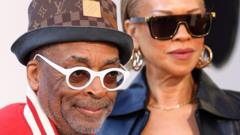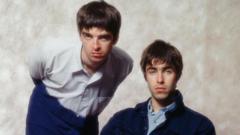In a world where identity continues to evolve, Ed Sheeran's declaration of 'culturally Irish' shines a light on the multifaceted nature of what it means to belong, both in Britain and Ireland, today.
**Understanding 'Cultural Irishness' in 2025: A Reflection on Identity**

**Understanding 'Cultural Irishness' in 2025: A Reflection on Identity**
The complexities of cultural identity amidst shifting landscapes and personal narratives, as illustrated by Ed Sheeran.
In recent discussions about cultural identity, Ed Sheeran’s acknowledgment of himself as “culturally Irish” has sparked an array of reactions across social media. The singer, raised in Framlingham, Suffolk, expresses a deep connection to Ireland, underscoring his ties through parental lineage—his father holds an Irish passport, and he has fond memories of summer holidays spent in Ireland. Yet, this claim has drawn criticism from individuals who question the authenticity of his connection, suggesting it’s conditional on convenience.
Sheeran’s reflections on his identity prompt a larger conversation on what it means to identify as Irish, especially as modern Ireland's identity morphs with an influx of diverse influences. Ros Scanlon, an Irish Cultural Centre programmer in London, highlights the importance of embracing one's heritage without invalidating another aspect of one’s identity, pointing out that Sheeran’s pride in his Irish background does not diminish his British identity.
This notion of dual identity resonates strongly within the wake of the Good Friday Agreement, as articulated by Belfast South MP Claire Hanna. More individuals now feel liberated to embrace both identities without the stigma of historical divisions. As Professor Linda Connolly from Maynooth University posits, Sheeran’s identification as culturally Irish is a reflection of broader experiences shared by many second-generation Irish individuals living in Britain.
In the wake of changing landscapes and evolving narratives, “cultural Irishness” remains in flux. The Irish experience in Britain can no longer be confined to binary definitions, with individuals holding influences from both cultural heritages, often leading to rich blended identities.
Echoing sentiments shared by Sheeran, Fergal Keane, a noted journalist, reflects on his blended identity formed through complex cultural experiences spanning from Ireland to London, emphasizing that identity cannot be reduced to a singular descriptor. His life story reflects a broader narrative shared among many—one shaped by interwoven cultural backgrounds and personal experiences.
The surge of Irish cultural figures in Britain also contributes to the shifting perception of Irishness. As artists from various genres garner recognition, their contributions pave the way for conversations about cultural identity that embrace multiplicity.
Beyond music and arts, the evolution of Irish identity reflects broader socio-political dialogues, especially regarding attitudes towards Northern Ireland, where historical memories continue to shape identities. The cultural melting pot consequently raises critical discussions about the past while influencing the present-day understanding of what it means to be culturally Irish.
Conclusively, Sheeran’s candid assertion of his Irishness emerges as a testament to evolving identities, reflective of a journey not just personal but also collective. It evokes contemplation around how overlapping identities can foster a more comprehensive understanding of culture, especially for future generations navigating their identities in an increasingly interconnected world. As we continue to dissect and celebrate these multifaceted cultural narratives, the objective should not be to confine identities, but to appreciate the richness they bring to our shared human experience.
Sheeran’s reflections on his identity prompt a larger conversation on what it means to identify as Irish, especially as modern Ireland's identity morphs with an influx of diverse influences. Ros Scanlon, an Irish Cultural Centre programmer in London, highlights the importance of embracing one's heritage without invalidating another aspect of one’s identity, pointing out that Sheeran’s pride in his Irish background does not diminish his British identity.
This notion of dual identity resonates strongly within the wake of the Good Friday Agreement, as articulated by Belfast South MP Claire Hanna. More individuals now feel liberated to embrace both identities without the stigma of historical divisions. As Professor Linda Connolly from Maynooth University posits, Sheeran’s identification as culturally Irish is a reflection of broader experiences shared by many second-generation Irish individuals living in Britain.
In the wake of changing landscapes and evolving narratives, “cultural Irishness” remains in flux. The Irish experience in Britain can no longer be confined to binary definitions, with individuals holding influences from both cultural heritages, often leading to rich blended identities.
Echoing sentiments shared by Sheeran, Fergal Keane, a noted journalist, reflects on his blended identity formed through complex cultural experiences spanning from Ireland to London, emphasizing that identity cannot be reduced to a singular descriptor. His life story reflects a broader narrative shared among many—one shaped by interwoven cultural backgrounds and personal experiences.
The surge of Irish cultural figures in Britain also contributes to the shifting perception of Irishness. As artists from various genres garner recognition, their contributions pave the way for conversations about cultural identity that embrace multiplicity.
Beyond music and arts, the evolution of Irish identity reflects broader socio-political dialogues, especially regarding attitudes towards Northern Ireland, where historical memories continue to shape identities. The cultural melting pot consequently raises critical discussions about the past while influencing the present-day understanding of what it means to be culturally Irish.
Conclusively, Sheeran’s candid assertion of his Irishness emerges as a testament to evolving identities, reflective of a journey not just personal but also collective. It evokes contemplation around how overlapping identities can foster a more comprehensive understanding of culture, especially for future generations navigating their identities in an increasingly interconnected world. As we continue to dissect and celebrate these multifaceted cultural narratives, the objective should not be to confine identities, but to appreciate the richness they bring to our shared human experience.





















